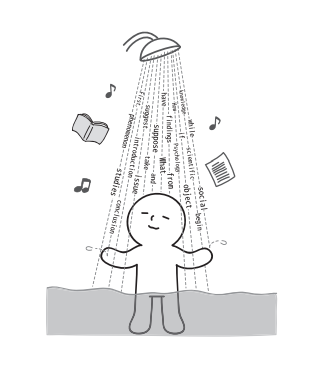Language Shower/OG
| Language Shower | |
| Contributors | Takashi Iba, Mami Sakamoto |
|---|---|
| Last modification | May 16, 2017 |
| Source | Iba & Sakamoto (2011)[1]; Iba (2010)[2]; Köppe & Nijsten (2012)[3] |
| Pattern formats | OPR Alexandrian |
| Usability | |
| Learning domain | |
| Stakeholders | |
Also Known As: Shower of Language (Shower of Language)[2]
“There is no way to stop sound and have sound.” — Walter J. Ong
You want to be good at listening and reading in a language.
To master languages is tough.
- • The sense of a language is much affected by the nature and culture where it is used.
- • The stock of expressions enables you to convey what you want to say.
- • It takes a long time to master a language.
Set up your environment where you always listen and read in the target language.
- • If you want to master a foreign language, set up your environment, for example, using mobile media, and to continue listening to and reading it.
- • Then, make rules to use the language every day, for example, just listen to an online radio broadcast or audio book in the background. Making a physical record of your learning activities as Tangible Piles (Tangible Piles) is a good way to maintain your motivation.
References
- ↑ Iba, T., & Sakamoto, M. (2011). Learning patterns III: a pattern language for creative learning. In Proceedings of the 18th Conference on Pattern Languages of Programs (PLoP 2011) (p. 29). New York:ACM.
- ↑ 2.0 2.1 Patlet mentioned in Iba, T. (2010). Designing a Pattern Language for Creative Learners.
- ↑ Also mentioned in Köppe, C., & Nijsten, M. (2012). A pattern language for teaching in a foreign language: part 2. In Proceedings of the 19th Conference on Pattern Languages of Programs (PLoP 2012) . New York:ACM.
